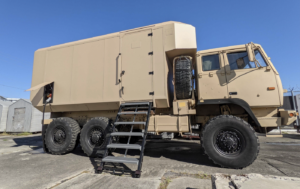Palantir [PLTR] has beaten out RTX [RTX] to continue developing the Army’s Tactical Intelligence Targeting Access Node (TITAN), the service’s new intelligence ground station.
The Army announced on Wednesday it has awarded Palantir a $178.4 million agreement for Phase 3 of TITAN, which includes the development and delivery of 10 prototypes and the “integration of new critical technologies.”

“We are thrilled to move into the next phase to deliver these revolutionary capabilities to our warfighters,” Col. Chris Anderson, the Army’s project manager for intelligence systems and analytics, said in a statement. “TITAN provides game changing technologies on how we collect, process and disseminate intelligence across the battlefield, providing us a decisive edge in supporting Multi-Domain Operations.”
The TITAN program is expected to deliver scalable and expeditionary intelligence ground stations capable of providing fused sensor data to weapons systems at the battalion level, with the Army describing the future system as “a crucial component to enable deep sensing and [shortening] the sensor-to-shooter loop.”
Palantir and RTX were each awarded $36 million, 14-month deals from the Army in June 2022 to build TITAN ground station prototypes for evaluation and testing after both companies participated in an initial phase to work through their designs (Defense Daily, June 28 2022).
Brig. Gen. Ed Barker, the Army’s program executive officer for intelligence, electronic warfare and sensors, told reporters in December the Army would select one of the two vendors in early 2024 to continue onto the prototype maturation phase (Defense Daily, Dec. 6).
“Palantir was selected as the preferred vendor after a competitive prototyping phase, in which it delivered a TITAN Advanced prototype based on operational requirements and user feedback from Soldier Touch Points,” the Army said in a statement. “The prototypes were evaluated at a capstone demonstration during the competition.”
Palantir, whose team for TITAN includes Northrop Grumman [NOC], Anduril Industries, L3Harris Technologies [LHX], Pacific Defense, SNC, Strategic Technology Consulting and World Wide Technology, described its TITAN solution as a “ground station that has access to space, high altitude, aerial and terrestrial sensors to provide actionable targeting information for enhanced mission command and long range precision fires.”
“This award demonstrates the Army’s leadership in acquiring and fielding the emerging technologies needed to bolster U.S. defense in this era of software-defined warfare. Building on Palantir’s years of experience bringing AI-enabled capabilities to warfighters, Palantir is now proud to deliver the Army’s first AI-defined vehicle,” Akash Jain, President of Palantir USG, said in a statement on Wednesday.
For Phase 3, the 10 prototypes Palantir is tasked with delivering will be split between five Advanced and five Basic variants of the platform.
The Army has previously said the “Advanced” version of TITAN is intended for heavier platforms such as tactical trucks and includes a space direct downlink capability, while the “Basic” model is designed for lighter platforms (Defense Daily, Aug. 31 2022)
Anderson told Defense Daily the “new critical technologies” to be integrated as part of Phase 3 include AI algorithms and machine learning capabilities out of Project Linchpin “to reduce the cognitive burden on the analyst and accelerate the sensor-to-shooter kill chain,” next-generation antennas for space, aerial and terrestrial sensors and advanced computing as well as working with new ruggedized servers and processors.
“TITAN will leverage AI/ML-enabled analytics and tools as they become available from government and commercial sources, which will increase the speed and accuracy of intelligence support to targeting and intelligence support to situational awareness/understanding,” Anderson said.